英语专四系列作文之范文赏析出国留学的利与弊
评价出国留学的利弊英语作文

评价出国留学的利弊英语作文The Pros and Cons of Studying Abroad.Studying abroad presents a unique opportunity for individuals to expand their horizons, gain cross-cultural understanding, and pursue academic and personal growth. However, this experience is not without its challenges and drawbacks. In this essay, I will explore the benefits and costs of studying abroad, discussing both the positive and negative aspects of this international educational endeavor.Benefits of Studying Abroad.1. Cultural Immersion: Studying abroad offers an unparalleled opportunity to immerse oneself in a new culture. Living and learning in a foreign country exposes students to different values, traditions, and ways of life. This cultural immersion enhances their understanding of the world and cultivates a more global perspective.2. Language Acquisition: For many students, studying abroad is the best way to learn a new language. Immersionin a foreign language environment accelerates language acquisition and improves fluency. This skill is invaluable in today's interconnected world, where proficiency in multiple languages can open doors to career opportunities and cultural exchanges.3. Personal Development: Studying abroad promotes personal growth and development. Living independently in a foreign country requires students to adapt to new environments, solve problems, and make decisions. These experiences foster resilience, self-confidence, and interpersonal skills.4. Expanded Academic Options: Studying abroad often provides access to a broader range of academic programs and courses than may be available domestically. Students can explore fields of study that are unique or more advanced than those offered at their home institutions.5. Professional Networking: Studying abroad offersstudents the chance to build professional networks with peers and mentors from around the globe. These networks can be invaluable in future career development, providing access to job opportunities, internships, and mentorship programs.Costs of Studying Abroad.1. Financial Burden: Studying abroad can be a significant financial investment. Tuition fees, living expenses, and travel costs can be prohibitively expensive for many students and families. While scholarships and grants may offset some of these expenses, the financial burden can still be substantial.2. Cultural Clash: While cultural immersion is a significant benefit of studying abroad, it can also lead to cultural clash. Differences in values, norms, and expectations can be jarring for students who are not accustomed to them. Navigating these differences can be challenging and emotionally draining.3. Isolation and Homesickness: Studying abroad often requires students to leave their families and friends behind. This can lead to feelings of isolation and homesickness, particularly during the initial adjustment period. Students must learn to cope with these emotions and find ways to connect with their new environment.4. Language Barrier: While studying abroad is an excellent opportunity to learn a new language, the language barrier can be a significant challenge. Communication difficulties can affect academic performance, social integration, and day-to-day life. Students must be willing to put in the effort to overcome this barrier through practice and language courses.5. Uncertainty and Risk: Studying abroad involves a degree of uncertainty and risk. Political instability, natural disasters, and other unexpected events can disrupt study plans and affect student safety. While most institutions strive to mitigate these risks, students must be prepared to navigate unexpected challenges and make informed decisions about their safety and well-being.In conclusion, studying abroad offers numerous benefits that can transform students' academic and personal lives. However, it is not without its costs and challenges. Students considering this option must carefully weigh the pros and cons, considering their financial situation, personal goals, and readiness to embrace the unique challenges and opportunities of studying abroad.。
留学的优点和缺点英文四级作文
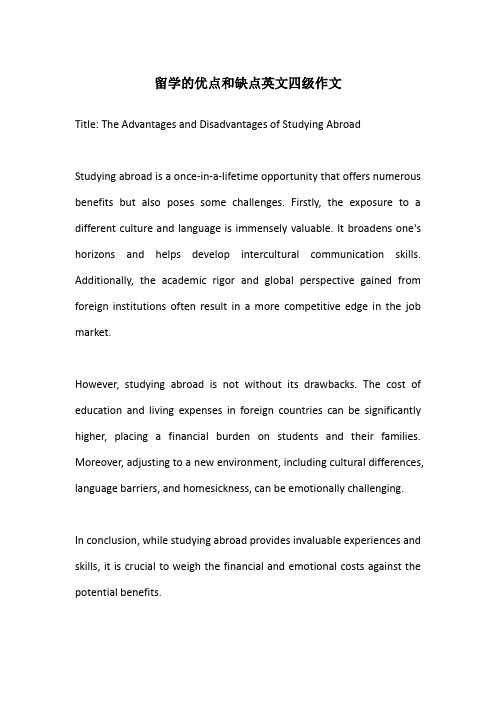
留学的优点和缺点英文四级作文Title: The Advantages and Disadvantages of Studying AbroadStudying abroad is a once-in-a-lifetime opportunity that offers numerous benefits but also poses some challenges. Firstly, the exposure to a different culture and language is immensely valuable. It broadens one's horizons and helps develop intercultural communication skills. Additionally, the academic rigor and global perspective gained from foreign institutions often result in a more competitive edge in the job market.However, studying abroad is not without its drawbacks. The cost of education and living expenses in foreign countries can be significantly higher, placing a financial burden on students and their families. Moreover, adjusting to a new environment, including cultural differences, language barriers, and homesickness, can be emotionally challenging.In conclusion, while studying abroad provides invaluable experiences and skills, it is crucial to weigh the financial and emotional costs against the potential benefits.翻译:留学的优点和缺点留学是一次千载难逢的机会,它提供了许多好处,但同时也带来了一些挑战。
海外留学的优点和缺点英语作文
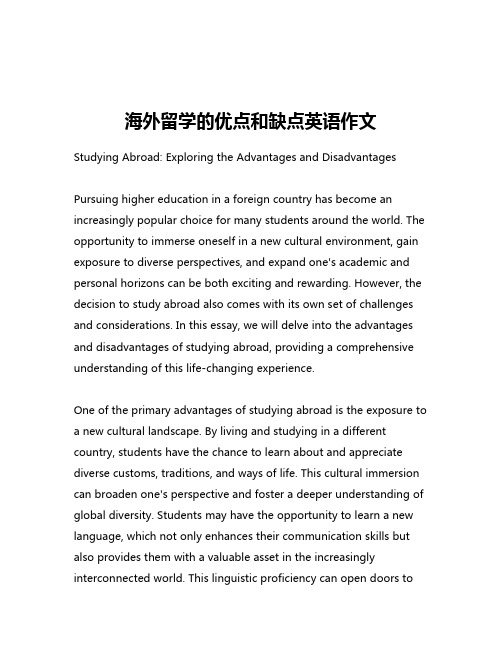
海外留学的优点和缺点英语作文Studying Abroad: Exploring the Advantages and DisadvantagesPursuing higher education in a foreign country has become an increasingly popular choice for many students around the world. The opportunity to immerse oneself in a new cultural environment, gain exposure to diverse perspectives, and expand one's academic and personal horizons can be both exciting and rewarding. However, the decision to study abroad also comes with its own set of challenges and considerations. In this essay, we will delve into the advantages and disadvantages of studying abroad, providing a comprehensive understanding of this life-changing experience.One of the primary advantages of studying abroad is the exposure to a new cultural landscape. By living and studying in a different country, students have the chance to learn about and appreciate diverse customs, traditions, and ways of life. This cultural immersion can broaden one's perspective and foster a deeper understanding of global diversity. Students may have the opportunity to learn a new language, which not only enhances their communication skills but also provides them with a valuable asset in the increasingly interconnected world. This linguistic proficiency can open doors tofuture career opportunities and personal growth.Furthermore, studying abroad often presents students with the chance to gain a more independent and self-reliant mindset. Living away from the comfort of their home environment requires students to navigate unfamiliar surroundings, manage their own finances, and make decisions independently. This level of autonomy can contribute to the development of essential life skills, such as problem-solving, adaptability, and resilience. These qualities are highly valued by employers and can give students a competitive edge in the job market upon their return.Another significant advantage of studying abroad is the opportunity to expand one's academic and professional horizons. By studying in a foreign institution, students may have access to specialized programs, cutting-edge research facilities, or unique learning opportunities that may not be available in their home countries. This exposure to diverse educational systems and approaches can broaden their academic perspectives and provide them with a more well-rounded education. Additionally, studying abroad can facilitate the establishment of international networks and collaborations, which can be beneficial for future career prospects and research endeavors.However, it is important to acknowledge the potential challengesand disadvantages associated with studying abroad. One of the primary concerns is the financial burden. Studying in a foreign country often comes with higher tuition fees, living expenses, and travel costs, which can be a significant financial strain on students and their families. This financial commitment can be a deterrent for some students, particularly those from underprivileged backgrounds, and may limit the accessibility of overseas education.Another potential disadvantage is the sense of homesickness and cultural shock that students may experience. Adapting to a new environment, language, and social norms can be a daunting and stressful process, especially for those who are far from their support systems. This adjustment period can take a toll on a student's mental health and well-being, potentially affecting their academic performance and overall quality of life.Additionally, studying abroad may present challenges in terms of credit transfer and academic recognition. Navigating the differences in educational systems, grading scales, and degree structures can be complex and may result in difficulties in transferring credits or having one's qualifications recognized upon return to their home country. This can create additional hurdles for students and may prolong the duration of their studies.Furthermore, the experience of studying abroad can lead to thedevelopment of a strong attachment to the host country, which may make it challenging for students to return to their home countries after graduation. This can result in a brain drain, where talented individuals choose to remain in the host country rather than contributing to the development of their home countries.In conclusion, studying abroad is a multifaceted experience that offers both advantages and disadvantages. While the cultural immersion, academic enrichment, and personal growth opportunities can be invaluable, the financial burden, homesickness, and academic recognition challenges must also be carefully considered. Ultimately, the decision to study abroad should be based on a thorough evaluation of one's personal goals, financial resources, and willingness to embrace the unique challenges and rewards of this life-changing experience. By weighing the pros and cons, students can make an informed decision that aligns with their educational and personal aspirations.。
出国留学的好处和坏处英语作文

出国留学的好处和坏处英语作文Going abroad to study has both advantages and disadvantages. On one hand, studying abroad can broaden our horizons and expose us to different cultures. We can learn firsthand about the customs, traditions, and lifestyles of people from other countries. This exposure can help us become more open-minded and tolerant, as we learn to appreciate and respect the diversity of the world.On the other hand, studying abroad can be challenging. We might face language barriers, cultural shock, and homesickness. It can be difficult to adapt to a new environment, make new friends, and navigate through unfamiliar systems. However, these challenges can also be seen as opportunities for personal growth. By overcoming these obstacles, we become more resilient, independent, and self-reliant.Another advantage of studying abroad is the opportunity to receive a quality education. Many countries haveprestigious universities and colleges that offer excellent academic programs. By studying in these institutions, we can gain access to world-class education and enhance our knowledge and skills. This can greatly benefit our future career prospects and increase our competitiveness in the global job market.However, studying abroad can also be expensive. Tuition fees, living expenses, and travel costs can add up quickly. Financial constraints can limit our options and make it difficult to fully enjoy the experience. Moreover, beingfar away from family and friends can be emotionally challenging. We might miss important events and milestones in their lives, and feel disconnected from our support system.Despite the challenges and disadvantages, studying abroad can be a life-changing experience. It allows us to step out of our comfort zone, gain independence, and develop a global perspective. It offers opportunities for personal and academic growth, and helps us build a network of international connections. Overall, studying abroad canbe a transformative journey that shapes our character and prepares us for a successful future.。
出国留学的好处坏处英语作文

出国留学的好处坏处英语作文English:Studying abroad has both benefits and drawbacks. On one hand, it provides students with the opportunity to experience new cultures, expand their perspectives, and build international networks. Students can also improve their language skills and gain a deeper understanding of global issues. Moreover, studying abroad can enhance personal growth by promoting independence, adaptability, and resilience. On the other hand, challenges such as homesickness, cultural shock, language barriers, and financial burdens may arise. Students may also face discrimination or struggle to adjust to a different educational system. Overall, studying abroad can be a life-changing experience that comes with both advantages and disadvantages.中文翻译:出国留学既有好处也有坏处。
一方面,它为学生提供了体验新文化、拓宽视野和建立国际人脉的机会。
学生还可以提高语言能力,并深入了解全球问题。
出国的优点和缺点英语作文
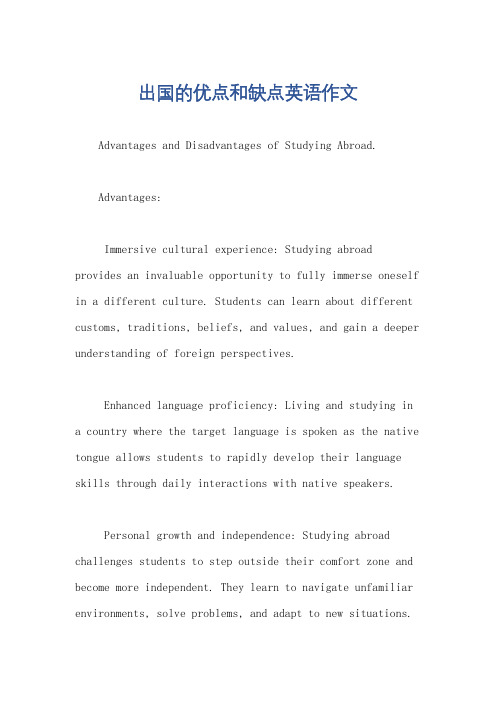
出国的优点和缺点英语作文Advantages and Disadvantages of Studying Abroad.Advantages:Immersive cultural experience: Studying abroad provides an invaluable opportunity to fully immerse oneself in a different culture. Students can learn about different customs, traditions, beliefs, and values, and gain a deeper understanding of foreign perspectives.Enhanced language proficiency: Living and studying in a country where the target language is spoken as the native tongue allows students to rapidly develop their language skills through daily interactions with native speakers.Personal growth and independence: Studying abroad challenges students to step outside their comfort zone and become more independent. They learn to navigate unfamiliar environments, solve problems, and adapt to new situations.Increased global awareness: Spending time in a foreign country broadens students' horizons and helps them develop a more global perspective. They learn about different political systems, economic models, and social structures, and gain a better understanding of the world around them.Improved career prospects: Studying abroad demonstrates to potential employers a student's adaptability, cultural sensitivity, and international experience. It can be a valuable asset in today's increasingly interconnected global workforce.Disadvantages:High cost: Studying abroad can be a significant financial burden. Students must consider tuition, living expenses, travel costs, and other associated expenses.Homesickness and culture shock: Leaving familiar surroundings and being immersed in a new culture can sometimes lead to homesickness or culture shock. Studentsmay feel overwhelmed, disoriented, or isolated at times.Academic adjustments: The academic systems and educational standards of different countries can vary significantly. Students may need to make adjustments to their learning style or coursework to succeed in their host institution.Language barriers: While studying abroad can greatly enhance language proficiency, students may initially encounter language barriers that can be frustrating or challenging.Limited time: Study abroad programs typically have a fixed duration, which may restrict students' ability to fully explore their host country and culture or pursue other interests.中文回答:出国留学的优点:沉浸式的文化体验,出国留学提供了全面融入不同文化之中宝贵的机遇。
出国留学好处和弊端英语作文
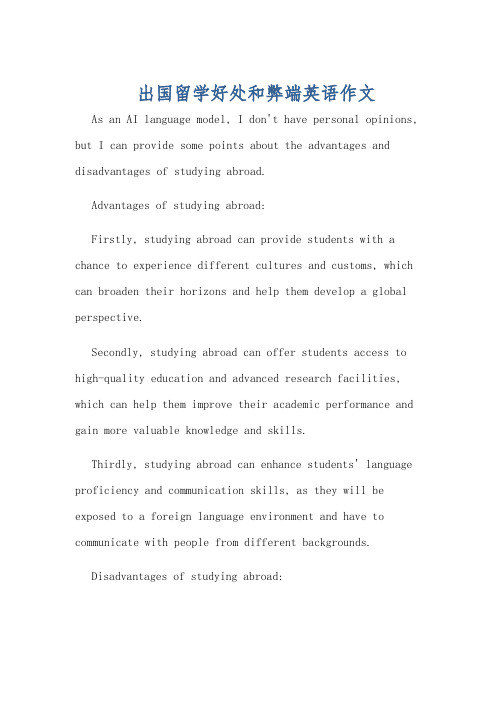
出国留学好处和弊端英语作文As an AI language model, I don't have personal opinions, but I can provide some points about the advantages and disadvantages of studying abroad.Advantages of studying abroad:Firstly, studying abroad can provide students with a chance to experience different cultures and customs, which can broaden their horizons and help them develop a global perspective.Secondly, studying abroad can offer students access to high-quality education and advanced research facilities, which can help them improve their academic performance and gain more valuable knowledge and skills.Thirdly, studying abroad can enhance students' language proficiency and communication skills, as they will be exposed to a foreign language environment and have to communicate with people from different backgrounds.Disadvantages of studying abroad:Firstly, studying abroad can be very expensive,including tuition fees, accommodation, food, transportation, and other expenses, which can put a heavy financial burden on students and their families.Secondly, studying abroad can be challenging, asstudents may face various difficulties and obstacles, such as cultural shock, language barriers, homesickness, and academic pressure, which can affect their mental health and well-being.Thirdly, studying abroad may also pose risks tostudents' safety and security, as they may encounterdifferent social and political situations, such as discrimination, racism, violence, and terrorism, which can endanger their personal safety and health.总之,出国留学有其利有其弊,需要学生根据自身情况和需求来做出决策,并做好充分的准备和规划,以克服各种挑战和迎接各种机遇。
出国留学的好处和坏处英语作文
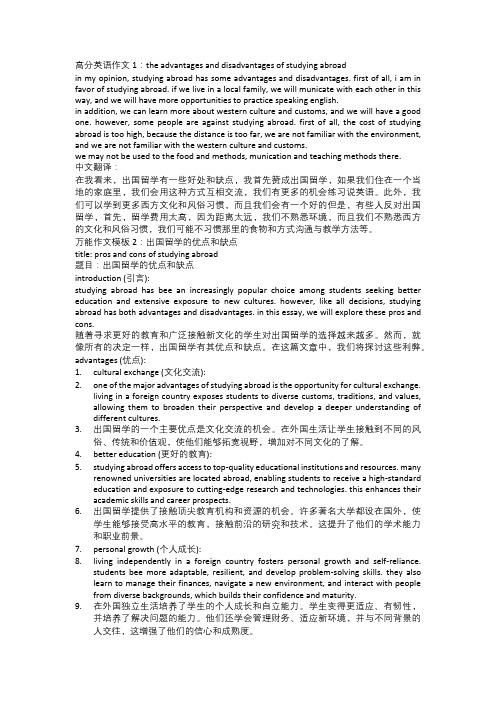
高分英语作文1:the advantages and disadvantages of studying abroadin my opinion, studying abroad has some advantages and disadvantages. first of all, i am in favor of studying abroad. if we live in a local family, we will municate with each other in this way, and we will have more opportunities to practice speaking english.in addition, we can learn more about western culture and customs, and we will have a good one. however, some people are against studying abroad. first of all, the cost of studying abroad is too high, because the distance is too far, we are not familiar with the environment, and we are not familiar with the western culture and customs.we may not be used to the food and methods, munication and teaching methods there.中文翻译:在我看来,出国留学有一些好处和缺点,我首先赞成出国留学,如果我们住在一个当地的家庭里,我们会用这种方式互相交流,我们有更多的机会练习说英语。
- 1、下载文档前请自行甄别文档内容的完整性,平台不提供额外的编辑、内容补充、找答案等附加服务。
- 2、"仅部分预览"的文档,不可在线预览部分如存在完整性等问题,可反馈申请退款(可完整预览的文档不适用该条件!)。
- 3、如文档侵犯您的权益,请联系客服反馈,我们会尽快为您处理(人工客服工作时间:9:00-18:30)。
英语专四系列:作文之范文赏析--出国留学的利与弊
题目:Studying Abroad: Hardships and Rewards
写作要求
Nowadays more and more students choose to go abroad after they graduate from colleges and universities. They say that they benefi t a lot from it, though some people argue that there are many hardships and diffi culties. What’s your opinion about it?
Write on Answer Sheet Two a composition of about 200 words on the following topic:
Studying Abroad: Hardships and Rewards
You are to write in three parts.
In the fi rst part, state specifi cally what your idea is.
In the second part, provide reasons to support your opinion OR describe your idea.
In the last part, bring what you have written to a natural conclusion or a summary.
Marks will be awarded for content, organization, grammar and appropriateness. Failure to
follow the instructions may result in a loss of marks.
审题思路
本题是一个观点选择型的题目,就目前大学生在毕业后选择留学的利弊孰大孰小进行分析。
题目可以从以下几个方面入手:
思路1:利大于弊
虽然有困难,但整体上利大于弊,利体现在:1. 教学软件硬件优异;2. 有利于将来就业等。
思路2 :弊大于利
虽然有好处,但整体上弊大于利,弊体现在:1. 费用昂贵;
2. 文化差异,难以融入其中等。
思路3 :应具体问题具体分析,因人而异
留学有益,体现参考思路1;
留学也有弊端,体现参考思路2 ;
是否选择留学,应根据个人情况而定。
Studying Abroad: Hardships and Rewards
There is no denying the fact that studying abroad is a hotly debated2 topic today. As far as I’m,concerned, I believe hardships and rewards coexist and people have to consider it from all sides.
引言部分:作者先提出留学是个热门话题,然后说明留学有利有弊应全面综合来考虑。
这表明下文将既讲利又讲弊。
Obviously, studying abroad has a number of rewards . In the first place, a student can have access to advanced science and technology as well as desirable working conditions which mightnot be available at home. In the second place, he can be exposed to entirely new
ideas and trends. Last but not least, by living and studying in a foreign country, one can improve his foreign language much faster than at home.
Nevertheless, as every coin has two sides, studying abroad also confronts one with a series of hardships. For one thing, learning a foreign language is far from an easy thing at the beginning for most people. For another, a completely new environment with different customs and habits may also be a barrier to overseas students, especially to the young. An added difficulty lies with finance: it can cost a lot to study abroad.
主体部分:作者先说有几个显而易见的益处是列举观点时常用的句式。
然后用“In the first place, ... In the second place, ... Last but not least”。
nevertheless进行转折,说明留学会让人遇到很多困难。
这时列举所用的句式换为“for one thing ... for another...”使文章更富有变化。
Therefore, studying abroad should be viewed as a two-edged sword, which presents us with10 both benefi ts and trouble s. The best policy11, as I see it, is to take into consideration his financial conditions and his ability to adapt to new surrounding. Personally,
I’d choose to go abroad and study if I find it necessary.
总结部分:作者概述上面所列利弊,用“a two-edged sword”来概括再恰当不过,并提出选择出国留学的标准应该是“take into consideration his financial conditions and his ability to adapt to new surrounding”。
亮点回放
1. there is no denying that:“无可否认”;还可以用undoubtedly ,without doubt等更为简洁的表达方式。
2. hotly debated: “被激烈讨论的”;相当于“heavily/frequently discussed”,但比之要g更地道些。
3. rewards: “奖赏、报酬、报答”;此处表示“回报”,近义词为“returns”。
4. have access to: “能获得”,access的形容词accessible也经常使用在be accessible to的词组中,注意与之区别。
5.desirable:“令人满意的,称心如意的”,另外它的反义词
undesirable表示“不尽如人意的”。
6. be exposed to: “暴露在……之下”,此处还可以用“be faced with ,be confronted with”等。
7. confront sb. with sth.: “使某人遭遇到(某事)”,此处注意与be exposed to的区别,前者不以人为主语,用主动语态;后者以人为主语,用被动语态。
8. far from: “远离”,此处表示“远非”,相当于never ,但语气委婉些。
9. barrier:“障碍”,近义词还有“obstacle ,block ,hardship ,setback”等。
10. present sb. with sth.: “给某人带来某物”,也可以用“provide sb. with sth.”,但present 显得更正式些。
11. policy : “政策、方针、保险单”,此处“the best policy ”表示“最好的办法”,用法地道。
